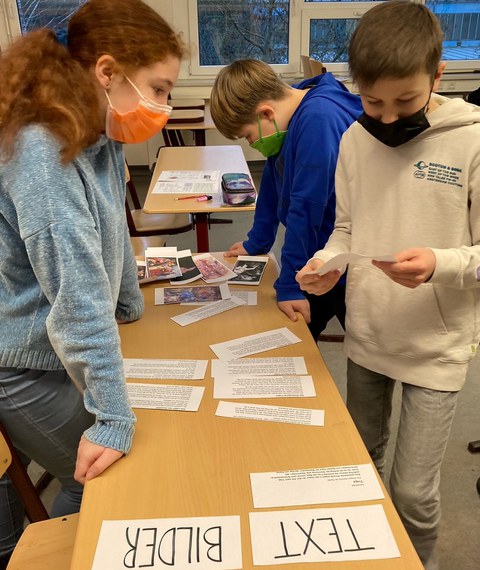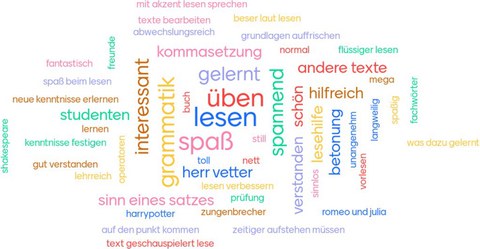Practical projects
KinderLeseUni
The KinderLeseUniversität is a service learning project for pupils and students that combines the acquisition of specialist knowledge with social engagement.
The project was initiated in 2011 by Ms. Nicole Berg, seconded teacher at the ZLSB. The cross-school cooperation with Dr. Ulrike Günther, Research Associate at the Chair of NDL and Didactics, has been in place since 2012. In the future, there will also be cross-university cooperation with trainee teachers and trainee teachers from the Saxon Training Center Dresden.
Registration for the KinderLeseUni is free of charge in order to enable as many children as possible to take part. Entire school classes are therefore invited to the Technical University to give them an insight into university life and the idea of a possible educational path.
The Children's Reading University also makes a practice-oriented contribution to the training of student teachers by enabling them to plan, design and reflect on children's seminars on teaching literature in teams. In doing so, the students apply their theoretical knowledge and sharpen their focus on the challenges of school practice.
During the KinderLeseUniversität, a lively dialog between the children, students, teachers and lecturers is encouraged in order to further improve the project.
The students develop their social skills by taking on organizational responsibilities, observing and supporting each other.
Children's literature is at the heart of the Children's Reading University. The current framework topics for the book selection mediate between the school's engagement with literature and the children's leisure reading.
In preparation for the children's seminars, the students visit the municipal libraries, gain an overview of the range of children's literature on offer and try out methods such as bookslam and library rallies.
In the Children's Reading University seminar, students acquire skills in the acquisition and motivating teaching of children's literature. On this basis, they develop the seminars for the Children's Reading University in interdisciplinary and cross-school teams and under the guidance of the lecturers.
For the Children's Reading University, the students design their seminar, have it evaluated by the pupils and evaluate it together with the lecturers.
They have the opportunity to revise their design and teach another class on the following day.
The course is compatible with the module in the supplementary area and can be credited.
The KinderLeseUni takes place during the lecture-free period: Lectures, breakfast in the canteen, children's seminars
Since it was founded in 2011, around 4,700 pupils have taken part in the Dresden Children's Reading University.
In 2015, the project was awarded the 'University Pearl' by the Stifterverband der deutschen Wissenschaft for innovative, exemplary university projects.
Digital Fellowship: "Social media in the German classroom"
The teaching research project "Social Media in German Lessons (SMiD)" by Prof. Dr. Dorothee Wieser and Prof. Dr. Simon Meier-Vieracker is being supported by the E-Learning Working Group of the Saxony Rectors' Conference with funding of €25,000 until the end of 2022 as part of a Digital Fellowship.
In cooperation with students, the project will involve reviewing, designing, testing and evaluating lesson plans on the topic of social media. A peer feedback platform will be developed specifically for this purpose and the results will be made available as open educational resources.
PROJECT (SEMINAR) READING PROMOTION
Individual reading promotion by student teachers - the "Reading Promotion Month" at the 116th secondary school
On the one hand: student teachers who often wish they had more opportunities to apply their subject-specific didactic knowledge in school and gain practical experience. On the other hand: a school with dedicated teachers who nevertheless sometimes reach their limits in everyday school life when it comes to supporting pupils in a very individual and personal way - e.g. in developing and improving their reading skills. So what could be more obvious than combining both perspectives? German teacher Ms. Willers from the 116th secondary school in Strehlen and Ms. Pollack, a member of the German didactics department at TU Dresden, thought: "Nothing could be more obvious!" and together they developed a concept for the "Reading Support Month" at the 116th secondary school and for the corresponding preparation of the students in the German didactics seminar "Promoting reading in heterogeneous learning groups: a theory-practice seminar".
In the first few months of the winter semester 2021/2022, a total of 20 student teachers of German acquired the basic didactic knowledge of reading skills and their acquisition and diagnosis as well as approaches and methods for differentiated support as part of the seminar. This laid the foundations for the planning and implementation of individual lessons in small groups (four to a maximum of seven pupils) and subsequent reflection.
At the same time, around 70 students from grades 6 to 10 at the 116th secondary school decided to take part in the 'Fördermonat Lesen' and so, in December 2021, the 16 groups got to know 'their' students. For the students, getting to know each other offered the opportunity to learn about the students' individual interests and goals and to incorporate them into their planning of the support measures. During the subsequent planning phase, the students also had the opportunity to discuss ideas or questions with their lecturer.
For three weeks in January 2022, the motto for both sides was: "Get up early!" - The support lessons were spread out over the week in the zero or first lesson. Due to the pandemic, further challenges had to be overcome - such as the implementation of corona tests - but these were reliably mastered by students and learners. The insights we gained as project leaders during our brief visits to the individual groups showed a consistently warm atmosphere in which the students addressed and supported 'their' pupils very individually using a wide variety of texts and methods, depending on the group.
We have created a word cloud to illustrate what the students associate with the "Reading" support month.


